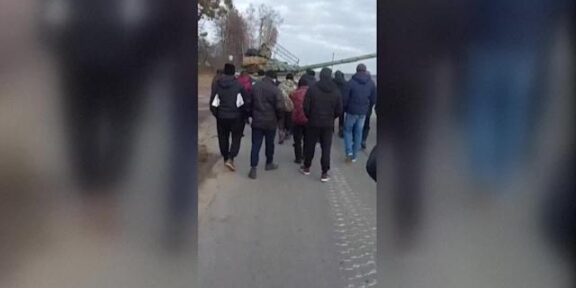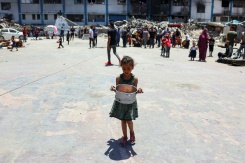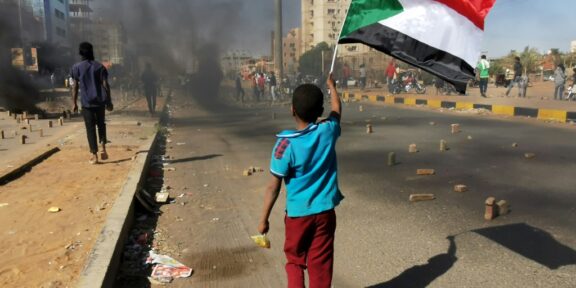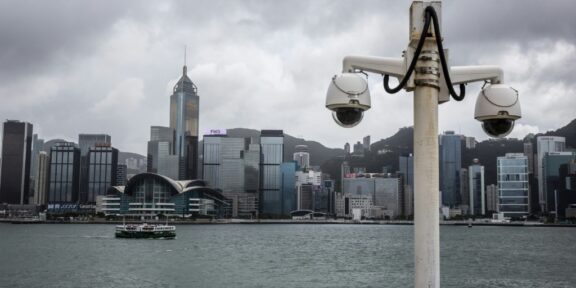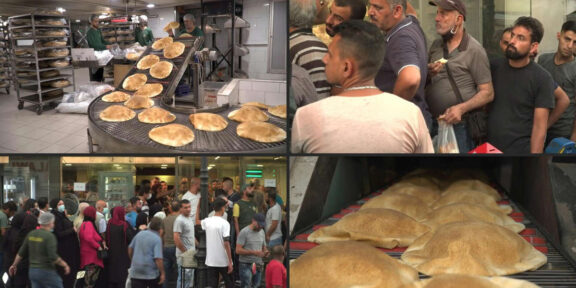The Israeli army said Saturday that three hostages mistakenly killed by soldiers carried a white flag and cried for help in Hebrew.
Families of other hostages held in Gaza called on the Israeli government to stop fighting and make a deal to secure their release.
Prime Minister Benjamin Netanyahu was due to hold a news conference later Saturday in which he was expected to address the families’ concerns.
Yotam Haim, Alon Shamriz and Samer El-Talalqa — all in their 20s — were shot during operations in Gaza City on Friday, sparking protests in Israel.
They were among about 250 people taken hostage during Palestinian militant group Hamas’s October 7 attacks in Israel, which killed around 1,140 people, mostly civilians, according to Israeli figures.
Vowing to destroy Hamas and bring back the hostages, Israel launched a relentless bombardment and ground offensive that has left much of the Gaza Strip in ruins. The territory’s Hamas government says the war has killed at least 18,800 people, mostly women and children.
Army spokesman Daniel Hagari said that during fighting in the Shejaiya district of Gaza City, troops “mistakenly identified three Israeli hostages as a threat and as a result, fired toward them and the hostages were killed”.
An army official said the hostages were all “without shirts” and had “a stick with a white cloth on it”, but a soldier felt threatened and opened fire.
“Two are killed immediately, one is injured and runs back into the building,” the official said, adding that the soldiers heard “a cry for help… in Hebrew”.
Despite a ceasefire order, “there’s another burst of fire towards the third figure and he also dies.”
The official called it a “tragic” event and “very hard day”, but said the troops had faced “intense combat in the area”.
Hundreds gathered in Tel Aviv later to call on Netanyahu’s government to secure the release of 129 hostages still held in the Hamas-ruled Gaza Strip.
Israel has previously said eight other hostages had died.
“We only receive dead bodies. We want you to stop the fight and start negotiations,” Noam Perry, daughter of hostage Haim Perry, said at an event organised by the Hostages and Missing Families Forum.
“We feel like we’re in a Russian roulette game,” said Ruby Chen, father of 19-year-old soldier Itai, who is among the captives.
“They explained to us first that the ground operation would bring back the abductees,” he said.
“It doesn’t work. Because since then, abductees have been seen returning, but not so much alive. It’s time to change this assumption,” he said.
– ‘He died hungry’ –
In November, a one-week truce saw 105 hostages including 80 Israelis freed in exchange for 240 Palestinians held in Israeli jails, but fighting has since resumed.
The three hostages’ deaths have heightened already fierce scrutiny of how Israel is conducting its ground and air assault in Gaza.
The White House, which provides billions of dollars in military aid to Israel, has voiced growing concern over civilian deaths.
“I want them to be focused on how to save civilian lives — not stop going after Hamas, but be more careful,” US President Joe Biden said this week.
News platform Axios said the director of Israeli intelligence agency Mossad, David Barnea, was due to meet this weekend in an unspecified location in Europe with Qatari Prime Minister Sheikh Mohammed bin Abdulrahman Al Thani, who helped negotiate the earlier truce.
In Gaza, fierce fighting continued.
The Israeli army said Saturday it had raided two schools which it said were Hamas hiding places in Gaza City.
The funeral was held in Gaza of Samer Abu Daqqa, a journalist with television network Al Jazeera killed by an Israeli strike on Khan Yunis on Friday. His colleague Wael al-Dahdouh was wounded.
“He died hungry, they died with nothing to eat, with hunger. Oh my darling,” said his grieving mother, Umm Maher.
More than 60 journalists and media staff have died since the war began, according to the Committee to Protect Journalists.
– Aid crossing opens –
In the face of growing international pressure, Israel announced a “temporary measure” allowing aid to be delivered directly to Gaza through the Kerem Shalom border crossing.
A World Health Organization representative said the decision was “very good news”.
Since the war began, aid has trickled into Gaza through the Rafah crossing with Egypt.
Humanitarian agencies have said the volume is just a fraction of what is needed to help the estimated 1.9 million Gazans displaced by the war.
– Widening fallout –
In the Israeli-occupied West Bank, eight Palestinians were arrested in Israeli raids, Palestinian news agency Wafa reported.
The war continues to be felt across the Middle East, with fears of a new front opening on Israel’s northern border with Lebanon, where it has exchanged regular fire with militants, mainly the powerful Iran-backed Hezbollah.
The Israeli army said a soldier was killed and two others wounded in the Margaliot area on the Lebanese border. A spokesperson confirmed to AFP the casualties were caused by a “hostile aircraft”.
The conflict has also caused major disruption to the key Red Sea shipping lane between Asia and Europe, with two more major firms announcing they were redirecting their vessels following repeated attacks by Yemeni rebels allied with Hamas.
The action by Mediterranean Shipping Company (MSC) and CMA CGM follows similar moves on Friday by Maersk and Hapag-Lloyd.
It comes after Yemen’s Iran-backed Huthi rebels launched repeated attacks on passing vessels in recent days.
The rebels also launched a wave of 14 one-way attack drones at Israel on Saturday, all of which were “shot down with no damage to ships in the area or reported injuries”, the US military’s Central Command said.
Yeswecantv


